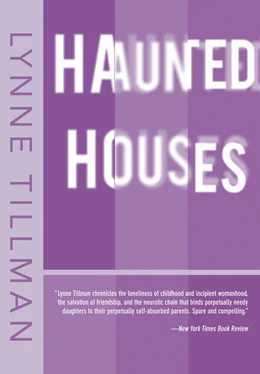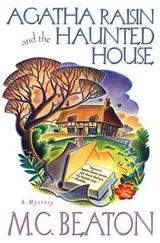Lynne Tillman - Haunted Houses
Здесь есть возможность читать онлайн «Lynne Tillman - Haunted Houses» весь текст электронной книги совершенно бесплатно (целиком полную версию без сокращений). В некоторых случаях можно слушать аудио, скачать через торрент в формате fb2 и присутствует краткое содержание. Год выпуска: 2011, Издательство: Red Lemonade, Жанр: Современная проза, на английском языке. Описание произведения, (предисловие) а так же отзывы посетителей доступны на портале библиотеки ЛибКат.
- Название:Haunted Houses
- Автор:
- Издательство:Red Lemonade
- Жанр:
- Год:2011
- ISBN:нет данных
- Рейтинг книги:5 / 5. Голосов: 1
-
Избранное:Добавить в избранное
- Отзывы:
-
Ваша оценка:
- 100
- 1
- 2
- 3
- 4
- 5
Haunted Houses: краткое содержание, описание и аннотация
Предлагаем к чтению аннотацию, описание, краткое содержание или предисловие (зависит от того, что написал сам автор книги «Haunted Houses»). Если вы не нашли необходимую информацию о книге — напишите в комментариях, мы постараемся отыскать её.
, Tillman wries of the past within the present, and of the inescapability of private memory and public history. A caustic account of how America makes and unmakes a young woman.
Haunted Houses — читать онлайн бесплатно полную книгу (весь текст) целиком
Ниже представлен текст книги, разбитый по страницам. Система сохранения места последней прочитанной страницы, позволяет с удобством читать онлайн бесплатно книгу «Haunted Houses», без необходимости каждый раз заново искать на чём Вы остановились. Поставьте закладку, и сможете в любой момент перейти на страницу, на которой закончили чтение.
Интервал:
Закладка:
Death had never touched Emily, except if she were to count the time she heard that mother scream upon finding her three-year-old-daughter dead in bed. From walking pneumonia, her own mother told her, saying, again, there’s nothing to fear but fear itself and tucking her into bed, as if to keep her from falling into the arms of God or the devil, whoever it is that takes little children away. But death, she recognized, had not really touched her. Edith’s eyes were dry and she was tired. So was Emily, whose thoughts kept her awake for several more hours.
Starting to read just before going out or starting a poem with her coat on, Emily found it hard to tell what was intended and what was not. In her own utterances. In Christine’s. For some years she held an idea in her mind — she could jump high and for long distances, if she let herself. For instance, she could, if she wanted, fly down subway stairs. She held the idea very far away as she might put it; it was never enunciated. Then it occurred to her that it was a fantasy or a dream, existing just below the surface of what was real. But what was real.
Her history professor looked at her and said, “What are you thinking about? The Constitution?” I can’t stay suspended in the air was the answer. But she said, “There’s no way that the Constitution could be interpreted strictly nearly two hundred years after it was written and it doesn’t matter what the Founding Fathers intended. Circumstances change.” Back to intention. American history was a refuge from the present, a distant impersonal past that occasionally spills into the present making her absorption in it reasonable, justifiable. She argued about the American Revolution as if it were going on. And much of the time Emily felt herself to be a suitor to ideas, to Christine, to her infrequent boyfriends, even to Edith.
The man Edith had slept with was the childless author of books on children. He didn’t, Edith silently agreed with her tenant, particularly like children, but that appealed to Edith, whose own children had given her enough trouble to warrant her some complicity with him. He was an educator, not a father, something she’d pointed out to Emily, who thought it was weird that he wrote about kids when he didn’t have them. Her education had not prepared her for millions of things, like living after the dead. She threw her head back, sharply, grabbed her tennis racket, and headed for the park. It was a great day to be alive, sort of.
The thirty or more years between Emily and Edith turned particular discussions into dead ends. Why Emily allowed that rock & roll musician to live on her floor some of the time was beyond Edith. After two weeks they had stopped having sex, which Edith didn’t know (and never would have dreamed); they had had it, and then it was over, and Emily got her period. Weighing it in her mind: first, there was sex, then there wasn’t; nothing reached an agreeable balance, as if the facts of a relationship could be weighed like a bunch of bananas. He’d bought her dinner and now he didn’t buy her dinner. He had had compunctions about doing sexual things with her she had barely any feelings about, had never considered. It’s when you get told things over and over that you hold opinions about them. Emily wrote: If you have principles, you don’t have to think. She looked forward to his almost comforting biweekly nocturnal visits, during which she and he behaved like priest and nun, and Emily fantasized them into the literature about the hue and false. Fidessa, Duessa. The red crosses in her eyes had nothing to do, in his mind, with the Red Cross Knight, but she made that reference. He was not a knight in shining armor, although his dark eyes did shine and look wet sometimes; she told herself she wasn’t looking for one anyway.
Christine didn’t like the musician much, but then Emily didn’t like Christine’s boyfriend, either, and it appeared that best friends often didn’t like each other’s boyfriends, though why was part of a mystery Emily supposed would one day be revealed. She had faith that, as she grew up, life’s intricacies would unravel like a skein of wool in front of more sophisticated eyes. She assumed she was not ready for many things which was why she didn’t feel exactly what she thought she should. And then she had feelings for which she had no reasons, feelings that no one had spoken to her about. She thought her relationship with Christine, for instance, might be unusual.
The musician was cryptic, with little education or interest in anything other than music, which he squandered, his teachers cried, on the likes of rock & roll. Movies on Forty-second Street at 1 A.M.gave a semblance of adventure to what Emily thought was a too normal, too ordered existence. The English musician’s group came out with a record and he was more insecure than ever. Emily was nurse to his wounds, imagined or real. The record producer punched their singer in the booth. He was exhausted, that’s why he was yellow, not because he had hepatitis again. His life was a diversion from her own, which was piled with books and unwritten poems and not-yet-handed-in papers. He, she supposed, lived in the present, but she preferred to live just a little behind the times, while being present at what was new, like a guest at an elaborately produced meal. Christine disagreed, urging Emily to get out of her house, not just to see him at 1 A.M., not just to see a movie. No one had ever cared so much about her as Christine did, Emily decided, and she was always in her mind, a reference point for her days, home base for her nights.
Opposites attract, not just between the sexes but within them, Emily determined, supporting her face in her hands. It didn’t really bother her that Christine didn’t like him. Emily was not mad with love. Dispassionately she rode the subway to the Cloisters and with her took Mansfield Park and the long subway ride was an empty, endless room filled with people who argued about whether or not acting was a corrupting influence, particularly on young women, because lines that were not true were spoken from their lips. They dissembled. When Emily applied cream to her face and hands she studied her skin, which didn’t yet have any lines. She wanted to have great, deep lines when she was old but she hoped her cheekbones would hold the skin up, much as a clothesline holds up clothes. When I have lines they’ll be my part, like an actor’s part. The English musician had compared her with Edith Sitwell, whose eccentricity was one day to be matched by Emily’s, he teased. Emily considered that a compliment, even though she felt he could never understand how she was different, but nevertheless, she monologued in front of the Unicorn Tapestry, nevertheless, being eccentric is taking liberties. And give me liberty or give me death.
Emily’s favorite history teacher might have appreciated Emily’s spouting that tired line in a medieval setting. Professor Wilson had announced on her first day teaching the freshmen that she didn’t want to be their friend, just their teacher, and Emily decided to become her friend. She set about on this quest and announced it to Christine, who insisted that Emily shouldn’t expect everyone to love her. Emily demurred, rebelling passively against the suggestion, hearing someone else inside her chant, Love is only a word and beauty is only a word and sticks and stones may break my bones, but words will never hurt me. That was a lie. More than anything else words hurt. That’s why I really hate words, and then aloud told Christine that she had written a line, “Wordlessly we stalk words,” and after this conversation would develop it. Christine, studying psychology and philosophy, talked about Jung. Had he really been a Nazi? He had written “No matter how much the parents, etc., have sinned against the child, the adult who is really adult will accept these sins as his own condition which has to be reckoned with. Only a fool is interested in other people’s guilt, since he cannot alter it. The wise learn only from their own guilt.” Each thought about the other and their friendship, which elicited dark thoughts and feelings, as well as the opposite.
Читать дальшеИнтервал:
Закладка:
Похожие книги на «Haunted Houses»
Представляем Вашему вниманию похожие книги на «Haunted Houses» списком для выбора. Мы отобрали схожую по названию и смыслу литературу в надежде предоставить читателям больше вариантов отыскать новые, интересные, ещё непрочитанные произведения.
Обсуждение, отзывы о книге «Haunted Houses» и просто собственные мнения читателей. Оставьте ваши комментарии, напишите, что Вы думаете о произведении, его смысле или главных героях. Укажите что конкретно понравилось, а что нет, и почему Вы так считаете.












